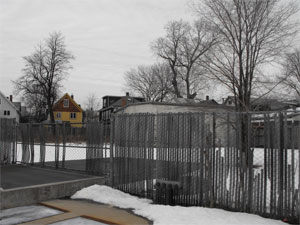
|
| 343 Summer St.~Photo by Bobbie Toner |
|
By Tom Nash
With
a police detail on hand to quell any protest, the Zoning Board of
Appeals ruled in favor of allowing a heavily opposed condominium
development a one-year extension to begin construction at its Feb. 18
meeting.
The ruling is the latest chapter of a seven-year legal
battle waged by both residents abutting the 343 Summer St. property and
its owners, the Dakota Partners, who came before the ZBA to ask for a
permit extension because of hardship – a loosely defined term that
became the center of the debate.
"I think the decision was made
one month ago," Evdokia Nikolova, a leader of the opposition to the
project, said after the vote. "They just put up a show for the
neighbors."
Dr. Mohamed Hanif Butt — who unsuccessfully sued
the developer — and a dozen other residents came to raise their
concerns about the project, primarily that the developer had ignored
concerns about the development's size. The project is planned to have
14 units.
Dakota Partners' attorney Richard DiGirolamo
reiterated that the request for an extension stemmed from the
difficulty faced during Butt's litigation against the developer and the
refusal of the city to allow them to cut down a shade tree to place a
required fire lane, which is the basis of a suit by Dakota against
Mayor Joseph Curtatone and Ward 6 Alderman Rebekah Gewirtz.
ZBA
Chairman Herbert Foster informed the crowd that two police officers
were on hand to prevent the outbursts that occurred at the Feb. 4
hearing on the permit extension. Several occurred anyway.
"If
you want to stay in this chamber, you keep your mouth shut unless
you're granted permission to speak," Foster said after the crowd jeered
DiGirolamo. "I've been on this board almost ten years, and it's
unprecedented that this board has ever taken the measure to have public
safety here because of those outbursts."
In an attempt to
minimize the disruption,Ward 6 Alderman Rebekah Gewirtz took a poll of
the residents' questions and grilled the board on why a developer who
is suing the city can claim the suit as a hardship. To be eligible for
an extension, the Dakota Partners had to prove it could not begin
construction within the two year permit length and show a good faith
effort to move forward.
At the Feb. 4 hearing, four Aldermen and
most of the neighbors on hand at the following meeting rejected the
developer's claim. A ruling was delayed while Assistant City Solicitor
decided if the request was valid. Shapiro explained at the Feb. 18
hearing that Dakota Partners did have the right to an extension despite
questions about the term of the original request.
Both
DiGirolamo and Shapiro agreed that no further extensions are possible
under Somerville's ordinance, although a day after the meeting Shapiro
sent an e-mail to the ZBA explaining the one-year limit was susceptible
to legal challenges based on a 2002 decision by the Massachusetts
Attorney General's rejection of a similar proposed ordinance in Swansea.
"While
the Attorney General opinion does not constitute case law," Shapiro's
e-mail stated, "I do agree with the rationale that an ordinance may not
limit the number of extensions where there is good cause to extend the
permit."
Under the Somerville ordinance, "good cause" is defined
as hardship faced by a builder including weather, "acts of God" and
labor strikes, although Shapiro said the law allowed for any
justification suitable to the ZBA. DiGirolamo made no attempt to
explain where the request fit into the listed categories.
As the
board approached a vote, Foster noted the Dakota Partners' pattern of
litigating adverse outcomes. "I personally think they would sue us if
we don't grant them the extension," he said. "Whether we give it to
them or not doesn't alleviate them of the responsibilities of the
permit."
After the unanimous vote approving the extension, Gewirtz said the ruling did not bode well for the city.
"(The
ZBA) probably had reason to be concerned about that, because (Dakota
has) sued everyone in their path. That is, quote, their 'good faith
effort,' " she said. "To me, a good faith effort is working with
neighbors. They only want to use a stick."
DiGirolamo said he
was pleased with the outcome. "We're happy (the ZBA) made the right
decision," he said, adding that the city's position is still
obstructing the project. "Seven years later, we don't even have a stick
in the ground."
|
Reader Comments